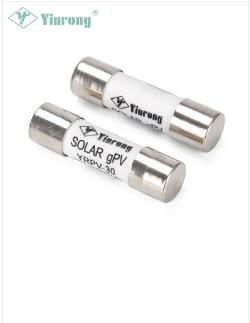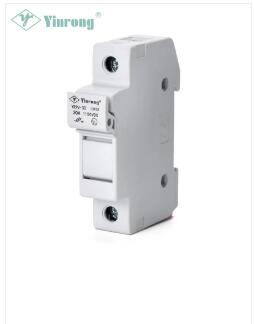Understanding Solar PV Fuses: The Essential Guide to Solar Safety
2024-11-08
As the world shifts toward sustainable energy, solar power has emerged as a leading solution for clean electricity. Solar photovoltaic (PV) systems are widely used in residential, commercial, and industrial applications, harnessing sunlight to generate power. However, the performance and safety of solar systems depend heavily on their components—and solar PV fuses are essential to protect these systems.

In this blog, we’ll explore what solar PV fuses are, why they’re necessary, how they work, and how to choose the right fuse for your solar installation.
What is a Solar PV Fuse?
A solar PV fuse is a protective device designed to safeguard solar photovoltaic systems from electrical overloads and short circuits. Like other fuses, it’s made to "blow" or disconnect the circuit if the current exceeds safe levels, preventing potential damage to equipment, fires, or other hazards.
Solar PV systems face unique electrical challenges, such as high direct current (DC) voltages, which require specialized fuses capable of handling these conditions. Standard fuses are typically not equipped to handle the high DC voltage levels found in solar PV systems, which is why specially designed PV fuses are necessary.
Why Are Solar PV Fuses Important?
1. Protection Against Overcurrent
Solar PV systems are subject to varying currents throughout the day, depending on sunlight intensity. When too much current flows through the system—due to a short circuit or fault—the PV fuse acts as a failsafe, breaking the circuit and protecting the system components.
2. Prevention of Electrical Fires
An overloaded PV system without a proper fuse can lead to overheating, which may result in electrical fires. Fuses are critical for preventing this by disconnecting the faulty section before a fire can start.
3. Longevity of Solar Equipment
Solar panels, inverters, and other system components are substantial investments. PV fuses extend the lifespan of these components by preventing the damage caused by electrical faults and overcurrents, reducing repair costs and downtime.
4. Safety Compliance
Many building codes and safety standards require overcurrent protection for solar PV installations. Proper fusing helps meet these standards, ensuring a safe and compliant installation.
How Does a Solar PV Fuse Work?
PV fuses contain a metal element that heats up and melts when the current passing through exceeds a designated level. When the fuse “blows,” it disconnects the circuit, stopping the flow of electricity to prevent equipment damage or fire.
Because solar systems use high DC voltages, PV fuses are specifically designed to handle the arc that can form when DC current is interrupted. These fuses are built to extinguish arcs rapidly and safely, which is essential for preventing fires or further system damage.
Types of Solar PV Fuses

Solar PV fuses come in several forms, each suited for different applications within the solar power system:
1. String Fuses
- Installed in the fuse box for each string (series of connected panels) to prevent current from flowing backward and damaging the panels. String fuses protect against overcurrent and are typically located in the string combiner box.
2. Array Combiner Box Fuses
- Combiner boxes aggregate multiple strings of solar panels. They require fuses to protect each string and ensure that a fault in one string doesn’t affect the others, improving overall system safety.
3. DC Fuses
- Specifically designed for the high DC voltages present in PV systems, DC fuses are used in various parts of the system, including the inverter. They have specialized features to safely handle the high and continuous DC loads.
4. AC Fuses
- While not unique to PV systems, AC fuses protect the AC circuits in hybrid PV systems or grid-tied setups where the current switches from DC to AC. These fuses prevent faults in the AC side, protecting inverters and other equipment.
5. Inline Fuses
- Inline fuses are often used in small or DIY solar setups. They connect directly to the positive line of the circuit, offering convenient protection without the need for a fuse holder.
How to Choose the Right Solar PV Fuse
1. Current Rating
- The fuse’s current rating should be slightly higher than the maximum current your PV system is expected to generate. Generally, PV fuses are rated at 1.25 to 1.5 times the normal current to ensure they trip only during actual overcurrent events and not due to normal fluctuations.
2. Voltage Rating
- Ensure that the fuse’s voltage rating matches or exceeds the system’s maximum voltage. Solar PV systems often operate at high DC voltages, so the fuse must be designed to handle this without risk of arc formation.
3. Compatibility with PV Equipment
- Solar PV fuses should be compatible with the other system components, such as the combiner box, inverter, and panel connections. Double-check equipment manuals to ensure the fuse type meets the manufacturer’s recommendations.
4. Environmental Durability
- Solar fuses often operate in harsh environments, especially in outdoor installations. Look for fuses with robust insulation and weather-resistant housing if they will be exposed to the elements.
5. Fuse Size and Form Factor
- The physical size and form of the fuse should match the mounting or holder options in your system. This is crucial for ensuring a secure connection, particularly in the combiner or inverter boxes.
Installation Tips for Solar PV Fuses
1. Choose the Right Location
- Fuses should be installed in easily accessible areas for maintenance, such as combiner boxes or within the inverter setup.
2. Proper Mounting
- Mount the fuse securely within the fuse holder to prevent disconnection due to vibrations or movement. Make sure it’s installed with the correct polarity in mind for DC circuits.
3. Regular Inspection
- Inspect the fuses periodically, especially after severe weather or system changes, to ensure they are in good condition and functioning properly. Replace any blown fuses immediately to maintain system protection.
4. Label the Fuses
- Clear labeling helps with troubleshooting and maintenance, especially in large solar installations where multiple fuses may be in use. It also improves safety by clarifying each fuse’s role within the system.
Benefits of Using High-Quality Solar PV Fuses
- Enhanced System Protection: High-quality fuses provide reliable protection against electrical faults, reducing the risk of damage to solar equipment.
- Increased Longevity: Quality fuses help extend the life of panels, inverters, and other components, maximizing your investment.
- Optimized Performance: Reliable protection ensures that your system runs smoothly, with fewer interruptions due to electrical faults.
- Lower Maintenance Costs: By preventing overcurrent issues, quality fuses reduce the need for frequent repairs and replacement of solar components.
Final Thoughts
Solar PV fuses are indispensable components that protect both your equipment and personal safety. They play a crucial role in maintaining the functionality and longevity of your solar system by preventing electrical faults and overcurrent issues. Investing in high-quality PV fuses and ensuring proper installation will give you peace of mind and help your solar setup perform optimally for years to come.
Whether you're a DIY solar enthusiast or a professional installer, don’t overlook the importance of these small but mighty components in safeguarding your renewable energy investment.


